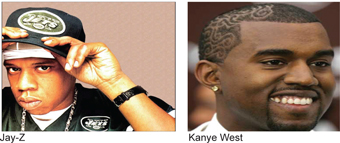The Gods of Hip Hop
By Iman Muhammad Ali -Guest Columnist- | Last updated: Aug 6, 2013 - 4:18:51 PMWhat's your opinion on this article?
A look at spirituality in the culture
For many years there’s been conflict over the consciousness Hip Hop and the commercialization of the art form. Back in the ‘80s, when the music and culture were still very much an underground movement, while many were fighting to bring Hip Hop to the mainstream the “cross-over” was considered the ultimate “sell-out.”

|
On one side of the argument, you had visionaries like Russell Simmons fighting for the advancement of the culture saying, “don’t treat our music and expression any different than you do Rock N’ Roll or pop”—and on the other side of the table there was a segment that believed an embrace by “mainstream America” would mean the rapping of the culture.
As a result, we began to see the divide and conquer strategy play out within the culture itself, where now we have the so-called “God-conscious” artists and the “elite” of Hip Hop, with a notion that if you’re making money in the industry in 2013, and a lot of it, you can’t have a “God-conscious”—you must be demonized and member of Illuminati.
This piece is not meant to argue the existence or non-existence of secret societies or the impact commercialization has had on Hip Hop culture—but to take another look at the game and the players in it and God’s hand on both sides.
Let’s start with this simple truth—Black people DO NOT control the entertainment industry. Not in film, music, fashion, TV, radio, distribution, NOWHERE are we “truly” in control of this industry. That’s a fact. Therefore, if we’re going to play the game—then it’s about playing it to the “best” of our ability and masterfully using it to gain some benefit while we live—that is luxury, money, good homes and friendships in all walks of life.
The other truth is that there is no such thing as a “poor” God. The notion that some Black people and some White people have is that “money is evil” and there is “righteousness” in poverty. There is nothing righteous about being without. God is a material God—if he wasn’t then there would be no universe. Let’s get that clear.
Now many were up in arms about Kanye West’s new album “Yeezus” and him likening himself to Jesus. For years people wanted to crucify HOV (Jay Z) for making himself into a god. But yet there’s an entire segment of God MCs in Hip Hop that are herald by their followers—yet somehow because Kanye and Jay Z have been so entrenched in gaining some material BENEFIT for themselves and their families from their talent—they are vilified.

|
The irony is that while the two of them embody the “cross-over” they seem to be the MOST relevant as far as giving some thought–provoking lyrics wrapped in a very commercialized package.
Both Kanye’s and Jay Z’s lyrics and business moves are “layered” and “coded” like the old spirituals developed by “Southern slaves that carried coded messages.” Only the slaves knew their meaning. It was through these songs that important information was passed along a system of communication. Coded songs conveyed messages about rebellions or escapes through the Underground Railroad. They were also a way for the slave to “sass the Massa” without fear of retribution. … They were the soul cry of the Black slaves over haunting melodies, rich with emotion – longing for freedom.”
And so it is with the tracks off “Yeezus” and even the title itself is layered and coded with soulful lyrics over new wave, punk, rock and hip hop beats. A cry from a descendant of slaves taking you on a journey from the era his mother lived – into the era of “New Slaves.”
An “Open Letter” off Magna Carta Holy Grail—where Jay Z responds brilliantly to his critics over his trip to Cuba.
Remember it was JUST last summer everyone was shouting “Hosanna, Hosanna” and singing the praises of Kanye and Jay Z when they were just “Ni**as in Paris.” But Kanye put it best in the “Don’t Like” verse that: “the media crucify me like they did Christ … they wanna find me not breathing like they found Mike (MJ).”
It’s not the first time Kanye has so identified “with” Jesus “The Christ” or even “as” Christ—who can forget the Chicago rapper bursting onto the music scene dropping the third single off his debut album (College Dropout) “Jesus Walks” at a time when no one in Hip Hop wanted to mention God consciousness. Not only did Kanye get continuous air play—he did what most preachers couldn’t do—bring the gospel into the night clubs with everyone screaming out, “Jesus Walks.” And if that wasn’t enough—he proved that you can make a song about God, get played and paid and win the most coveted award in the music industry—the Grammy. This broke the glass ceiling on the belief that “conscious” songs couldn’t get airplay.
But walking with God wasn’t enough for Kanye—two years later he appears on the cover of Rolling Stone Magazine with a crown of thorns on his head—as Jesus himself. The image of a “Black” Jesus was always unsettling to White America—even though J. Edgar Hoover was on the lookout for the rise of a “Black Messiah” or a charismatic leader; not knowing that one day the idea of Christ would move from the notion of “one” charismatic being or leader to a “mass” consciousness carried through a portal called rap.
Inside the Rolling Stone magazine—Kanye also posed as Muhammad Ali—and was quoted as saying, “In America, they want you to accomplish these great feats, to pull off these David-Copperfield-type stunts.” “You want me to be great, but you don’t ever want me to say I’m great?”
But Kanye keeps proving his “mastery” over his art and his growing consciousness that He “is” a God—coupled with his boldness to proclaim it to the world on his new album “Yeezus” with the third track “I Am A God.” Of course, he received the all too familiar onslaught of criticism and scrutiny from the media.
According to the Huffington Post, “Jon Parles at the New York Times called the album “an aggressive demand for attention” while Rolling Stone’s Jon Dolan said, “’Yeezus’ is the darkest, most extreme music Kanye has ever crooked up, an abrasive album” —even GlobalGrind.com called Kanye “The Most Dangerous Black Man in America” after the debut of “New Slave” on Saturday Night Live.

|
What makes Kanye “The Most Dangerous Black Man in America?” Because he called himself a god? What many don’t understand is that it was not that Honorable Elijah Muhammad called the White man the devil that made him dangerous—but that he called the Black man God: The Maker, The Owner, The Cream of The Planet Earth- God of the Universe. Your open enemy never wanted you to know the truth of your identity.
But this is the truth that took a Malcolm Little and made Malcolm X. This is the truth that took Cassius Clay and turned him into the Heavyweight Champion of the World and Greatest of All Time—Muhammad Ali. This is the truth that took Louis Wolcott and made The Honorable Minister Louis Farrakhan the most fearless Black man in America and world today. And this is the truth that made Chuck D and Professor Griff—Public Enemy number one. This is the truth that “made” Hip Hop the most dangerous art form in America. Because in the beginning artists like The Poor Righteous Teachers, Brand Nubians, Paris, Raekwon and the Wu-Tang Clan, KRSOne, Rakim, Fab 5 Freddy, Gangstarr, Big Daddy Kanye, dared to prick the conscious mind of young people by uttering the Teachings of The Honorable Elijah Muhammad over beats—EVEN if they called it the teaching of the Nation of Gods and Earths or Five Percent Nation.
The TRUTH is there would have been no “Clarence 13X” or Nation of Gods and Earths—if it were not for The Most Honorable Elijah Muhammad and the Lessons given to him by Master Fard Muhammad. Who taught you that you were a God? No preacher or Imam taught you that you were God—other than the Honorable Elijah Muhammad. So every rapper that has ever uttered the Lessons or called/calls himself a “God” bears witness to impact and the influence of The Honorable Elijah Muhammad and the presence of his reminder The Honorable Minister Louis Farrakhan.
It’s no coincidence that Kanye proclaimed at his NYC album release party that “’West is my slave name” … “’Yeezus is my god name.’” Who taught you that “West” was your “slave” name?
And Jay Z appearing recently in an interview wearing the Universal Flag Medallion—and when asked by a reporter—he said, “religion is like your personal computer—you don’t let everyone on your computer.”
We may never see the return of the God MCs as we knew them in the ‘80s—and should we expect the rap to be the same in the age of modern technology and advancements.
Should we expect the methods of warfare or REVOLT to look and feel like the movements and music in the ‘60s and ‘80s—when the methods of warfare have changed?
Let’s open the cipher.
(Iman Muhammad Ali is a television writer/producer and entertainment marketing executive. Follow her on Twitter @ ImanMuhammadAli.)
INSIDE STORIES AND REVIEWS
-
-
About Harriett ... and the Negro Hollywood Road Show
By Rabiah Muhammad, Guest Columnist » Full Story -
Skepticism greets Jay-Z, NFL talk of inspiring change
By Bryan 18X Crawford and Richard B. Muhammad The Final Call Newspaper @TheFinalCall » Full Story -
The painful problem of Black girls and suicide
By Charlene Muhammad -National Correspondent- » Full Story -
Exploitation of Innocence - Report: Perceptions, policies hurting Black girls
By Charlene Muhammad -National Correspondent- » Full Story -
Big Ballin: Big ideas fuel a father’s Big Baller Brand and brash business sense
By Bryan Crawford -Contributing Writer- » Full Story






 Click Here Stay Connected!
Click Here Stay Connected!








